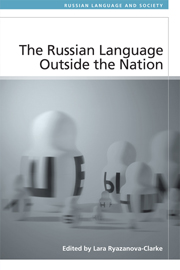Book contents
- Frontmatter
- Contents
- Notes on Contributors
- Cyrillic Transliteration System Adopted in the Book
- Introduction: The Russian Language, Challenged by Globalisation
- PART I Russian and Its Legal Status
- 1 International Law, Minority Language Rights and Russian(s) in the ‘Near Abroad’
- 2 The Russian Language in Ukraine: Complicit in Genocide, or Victim of State-Building?
- PART II Linguistic Perceptions and Symbolic Values
- PART III Russian-Speaking Communities and Identity Negotiations
- PART IV Language Contact and the Globalisation of Russian
- PART V Globalisation of Russian as Soft Power
- Index
2 - The Russian Language in Ukraine: Complicit in Genocide, or Victim of State-Building?
from PART I - Russian and Its Legal Status
Published online by Cambridge University Press: 05 September 2014
- Frontmatter
- Contents
- Notes on Contributors
- Cyrillic Transliteration System Adopted in the Book
- Introduction: The Russian Language, Challenged by Globalisation
- PART I Russian and Its Legal Status
- 1 International Law, Minority Language Rights and Russian(s) in the ‘Near Abroad’
- 2 The Russian Language in Ukraine: Complicit in Genocide, or Victim of State-Building?
- PART II Linguistic Perceptions and Symbolic Values
- PART III Russian-Speaking Communities and Identity Negotiations
- PART IV Language Contact and the Globalisation of Russian
- PART V Globalisation of Russian as Soft Power
- Index
Summary
INTRODUCTION
This chapter tracks the fate of the Russian language in Ukraine. The fate of Russian in Ukraine, and indeed of Ukrainian in Ukraine, has been at the centre of heated political debates ever since Ukraine became independent, on the collapse of the USSR in late 1991.
On 14 February 2010 the (ethnic Belarussian, as it happens) Viktor Ianukovich was declared the winner in the presidential elections, beating Iulia Tymoshenko by just 3.48 percentage points (Polityuk and Balmforth 2010). Despite having campaigned on a promise to make Russian the second official language of Ukraine, in March 2010 President Ianukovich recognised that awarding Russian official status would be very difficult, and would require an amendment to the 1996 Constitution. Instead, he stressed the importance of implementing the Council of Europe's 1992 European Charter for Regional or Minority Languages (henceforth European Charter) (Council of Europe 2010). Boris Kolesnikov, the deputy head of the Party of Regions was reported as saying:
Taking the European Charter of Languages as a guide, we have prepared a very good law, which the President will present in the next 15–20 days. In that draft law, we give the regions certain rights [in relation to the Russian language]. If, in certain regions, they don't want to implement that, then it's up to them. (Masalkova 2010)
- Type
- Chapter
- Information
- The Russian Language Outside the Nation , pp. 56 - 78Publisher: Edinburgh University PressPrint publication year: 2014

